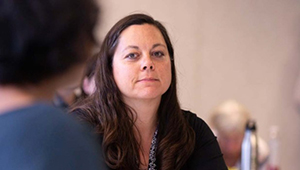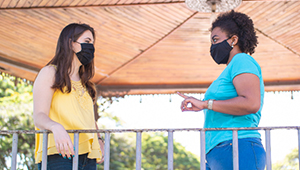Overcoming undervaccination

Clarissa Hsu, PhD, asked parents why they decline or delay vaccinating their children
COVID-19 raised our awareness about how beliefs about vaccination can vary. Even before the pandemic, though, undervaccination of children — meaning they have some but not all recommended vaccines — was a public health concern.
Clarissa Hsu, PhD, associate investigator at Kaiser Permanente Washington Health Research Institute (KPWHRI), studies why people accept or decline vaccines and ways to help people overcome barriers to getting vaccinated. In a new paper in Academic Pediatrics, Hsu and colleagues talked with parents of children who were not up to date on all their recommended vaccines. In focus groups, the parents answered questions about their reasons for skipping or delaying vaccinations.
"Only a small number of parents refuse any vaccines for their children," Hsu said. "Research shows that parents whose children are behind schedule on vaccinations are often open to information and help in keeping their children fully vaccinated." Hsu often works with individuals from diverse communities, so she feels that asking people within different communities is critical to helping to improve their health care and access to it.
Talking with multiple communities
With Vax Northwest, a local partnership to promote vaccine confidence, Hsu and colleagues conducted 4 focus groups in Washington state with parents who did not have strong antivaccine beliefs but whose 2- to 4-year-old children were not fully vaccinated. The groups discussed reasons for undervaccination and ways to help with vaccination.
To gain a variety of perspectives, focus group participants were recruited from rural and urban areas and different education and income levels, with 54% reporting annual incomes under $45,000. Of the 41 participants, 27% were single, separated, or divorced, and family sizes ranged from 1 to more than 4 children. One group had participants from the Somali community, in cooperation with the Seattle Somali Health Board.
Seeing themes in responses
"We saw some differences in reasons that participants from different communities gave for having undervaccinated children," Hsu said. "Our results could help in developing community-specific strategies to help parents overcome barriers to vaccination."
For example, individualism and control were common themes when parents talked about delaying or declining vaccinations. Comments were often about customizing care and controlling risks based on a child's unique circumstances. The Somali participant group, while also expressing points in this theme, more strongly emphasized concern that vaccines would cause developmental delays. They more often mentioned worries related to religious beliefs — for example, that vaccine ingredients might include pork products.
Focus group parents also discussed reasons in favor of vaccination. These reasons included vaccine requirements by health care providers or schools and recommendations from trusted medical professionals. Personal experience was important, both negative experiences with vaccine-preventable diseases such as knowing someone affected by polio, and positive experiences growing up in a family that valued vaccination.
The parents also described practical barriers to keeping up with vaccinations. For example, they told of disruptions in insurance coverage and medical records when moving or changing insurance or providers. The COVID-19 pandemic likely made these types of barriers even more pronounced for many families and created major delays in getting care.
Tailoring strategies to increase vaccination
Based on these results, Hsu and colleagues recommend strategies to increase childhood vaccination. Practical solutions include easier transfer of vaccination records when families change insurance or providers. Communication strategies include providing vaccine information that is easy for parents to understand, in their preferred language, and offered before visits in which vaccine decisions will be made.
Parents wanted opportunities to discuss vaccine concerns, one on one and in groups, with medical professionals. The researchers noted the interest in this approach at the Somali community focus group, which was conducted by a physician-researcher who is a native Somali speaker. After the focus group ended, many parents stayed to ask the physician questions about vaccines.
In short, the conclusions from the study indicated 3 ways to increase childhood vaccination for families with undervaccinated children. First, make it easy to get vaccinated, by removing barriers related to changing insurance or providers. Second, make it hard to be undervaccinated, with vaccination requirements by child care, schools, and health care. Finally, account for differences in the reasons that communities and individuals have for undervaccination and provide information that addresses their specific questions about vaccines.
Clarissa Hsu’s KPWHRI coauthors are Sarah Evers and Adjunct Researcher John Dunn. Other coauthors are Anisa Ibrahim, M. Patricia deHart, Paul Throne, Mackenzie Melton, Edgar K. Marcuse, Ahmed Ali, and Annika M. Hofstetter.
By Chris Tachibana
New funding

KPWHRI to launch study on vaccine hesitancy among long-term care workers
The Patient-Centered Outcomes Research Institute plans to award $4.75 million to compare ways to raise COVID-19 immunization rates.
Healthy Findings Blog

Vaccine hesitancy in the time of COVID-19
Can lessons from Immunity Community help build acceptance of COVID-19 vaccines? Clarissa Hsu, PhD, thinks so.



